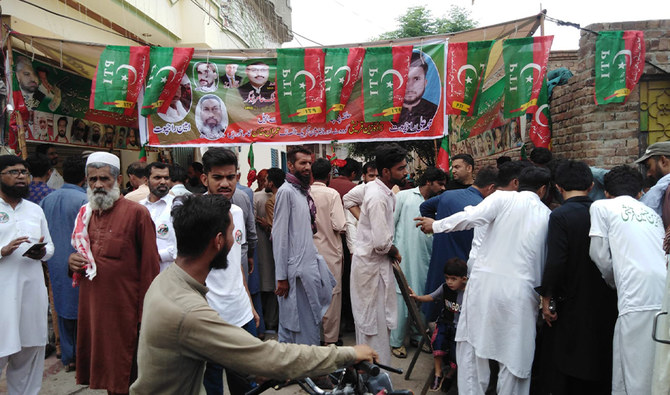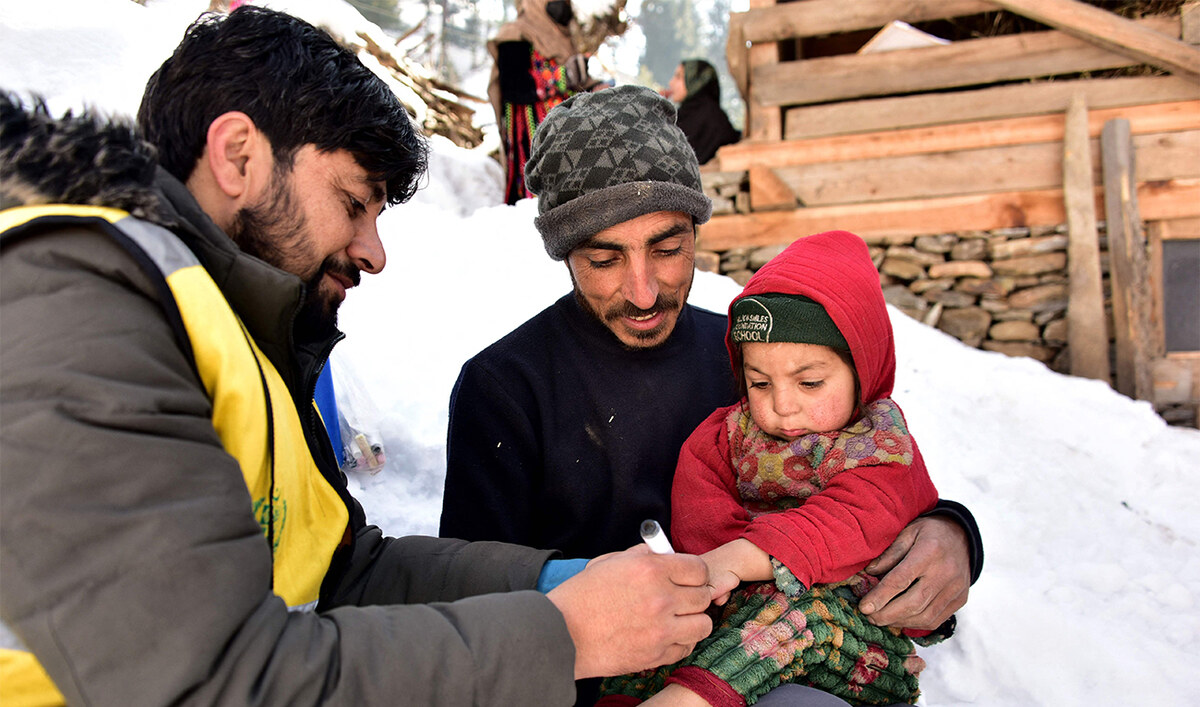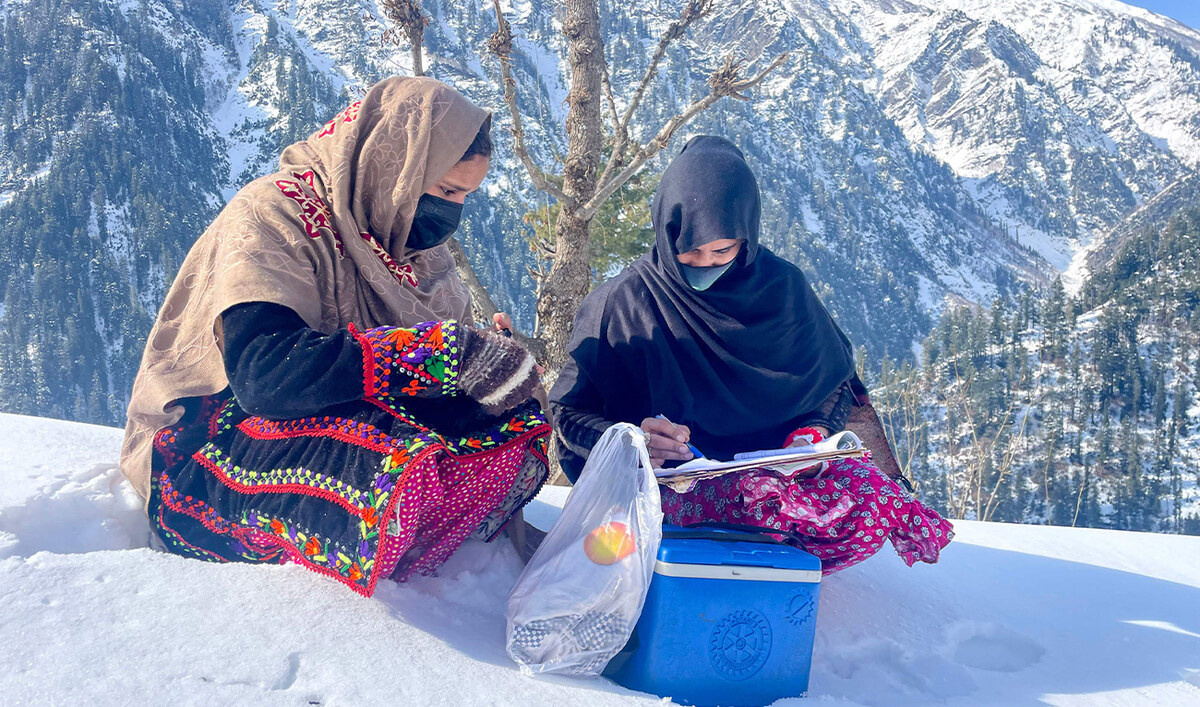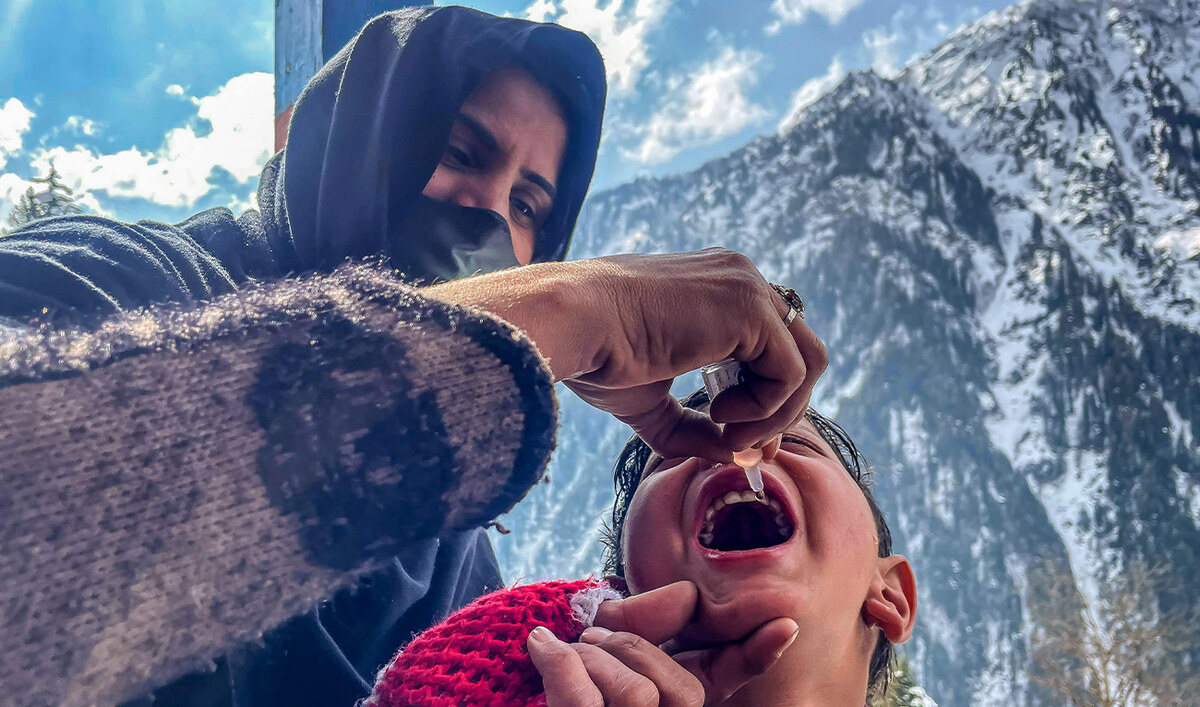ISLAMABAD: Polling for by-elections on 20 high-stakes Punjab Assembly seats, closely contested by the Pakistan Muslim League-Nawaz (PML-N) and the Pakistan Tehreek-e-Insaf (PTI) parties, has ended and a vote count is underway, after clashes between supporters of rival political parties in multiple areas.
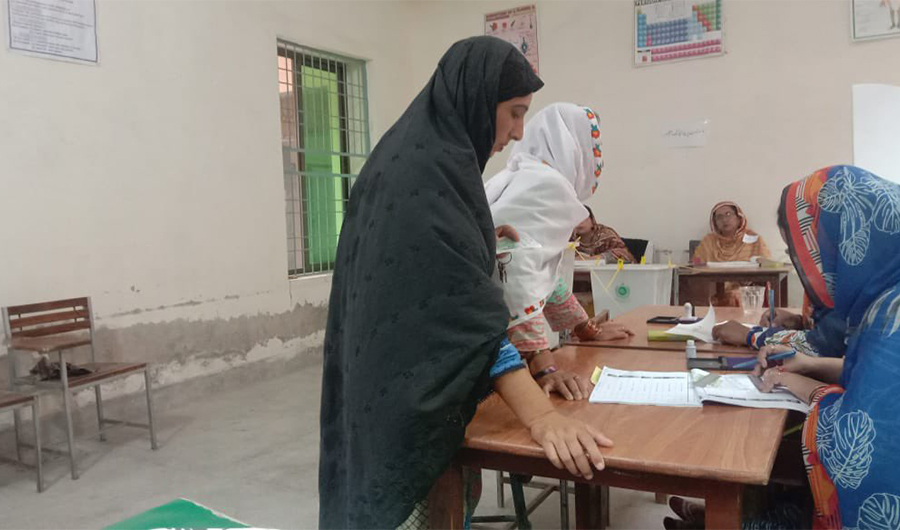
A woman cast her vote at a polling station in Pakistan's populous province Punjab on July 17, 2022. (Election commission of Pakistan)
The polling process started at 8am and continued until 5pm, after which the counting of votes is underway. The seats fell vacant after the Election Commission of Pakistan (ECP) disqualified 25 PTI lawmakers for switching their loyalties and voting for Hamza Shehbaz in an April election for the chief minister's slot. The ECP had announced fresh polls on 20 general seats as five of the disqualified members were elected on reserved seats for women and religious minorities.
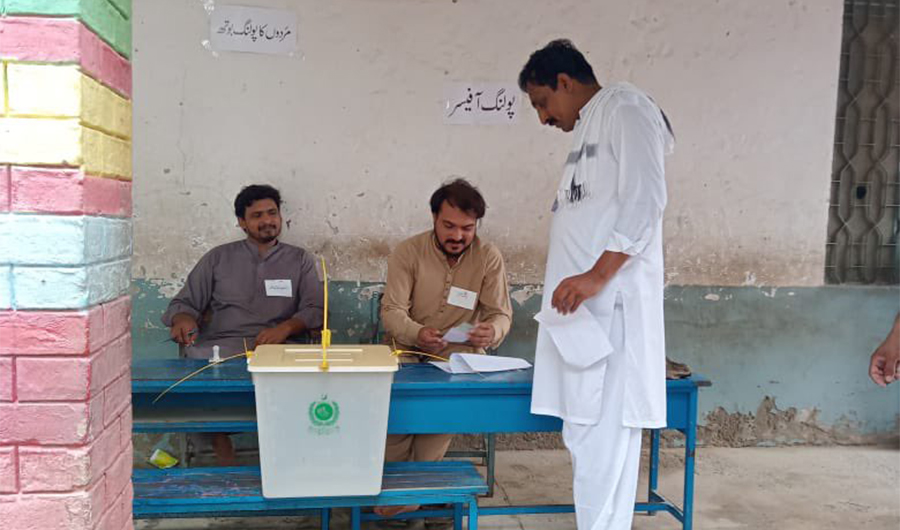
A man cast his vote at a polling station in Pakistan's populous province Punjab on July 17, 2022. (Election commission of Pakistan)
The by-elections have dominated Pakistan’s political landscape in the recent weeks as the ruling PML-N and the opposition PTI vie for the maximum number of seats that will also determine the fate of CM Shehbaz.
While the voting process largely remained calm in most areas, clashes were reported between the supporters of the two main political parties in Lahore’s PP-158 constituency. In a video that went viral on social media, a PML-N supporter accused PTI leader Jamshed Iqbal Cheema of inflicting a head injury on him. Police officials in Punjab said they had decided to arrest Cheema for the alleged assault, local media reported.
PML-N leader Attaullah Tarar accused PTI’s Shah Mahmood Qureshi of attempting to disrupt polling process in Multan and to buy people’s votes at a factory.
The situation turned tense in Muzaffargarh when PTI leader and a close aide of former PM Imran Khan, Dr. Shahbaz Gill, was arrested for showing up at different polling booths with private guards dressed up as paramilitary FC personnel.
Gill denied the charges and said he was arrested by the police without any warrants. He said he would announce his future course of action after holding discussions with his lawyers.
According to Geo News, local police arrived at the scene to drive the guards out of the factory.
Earlier in the day, Prime Minister Shehbaz Sharif urged people in a string of Twitter posts to consider the “dark days” of the PTI rule that lasted for about four years while electing their representatives.
“Punjab has seen the worst-ever misgovernance [under the PTI rule],” he said. “Citizens were deprived of free medicines & scholarships. Civil & police transfers/postings were on sale. Quality of municipal services plummeted & lawlessness became rampant. Manner in which Punjab was treated was an insult to people.”
Former prime minister Imran Khan applauded his party supporters for casting their ballot despite all the “harassment.”
“I am pleased to see our voters coming out to cast their votes in large numbers & resisting all pressures & harassment,” he said on Twitter. “I want all those, esp our women, who have to still come out to cast their vote to do so as this is an election for Pakistan's sovereignty & Haqeeqi Azadi [real independence].”
According to the local media, the Election Commission of Pakistan (ECP) has taken notice of violence in different provincial assembly constituencies and will also be probing any rigging allegations.
The Pakistan Army already said on Saturday its troops would only act as “Quick Reaction Force” to address any security issues that could arise during the polling process.
Political analysts expect a close contest among PTI and PML-N candidates in each constituency, though a large number of independents and candidates of other parties, including the Tehreek-e-Labbaik Pakistan (TLP), Jamat-e-Islami (JI), Jamiat Ulema-e-Islam Pakistan (JUI-P), Awami National Party (ANP) and Tehrik-e-Jawanan Pakistan (TJP), are also contesting the elections.
Habib Akram, a political analyst and a TV talk show host, said the results of the by-elections on 20 seats would be crucial as they would dictate the future of the Shehbaz government in Punjab.
“If we go by the public sentiment in each constituency, then the PTI should easily win 15 out of 20 seats,” Akram told Arab News. “People in these constituencies feel that this is a make-or-break moment for the country due to the PTI’s narrative of a ‘regime change conspiracy’.”
He said the Pakistan Democratic Movement (PDM), a coalition of nine parties that overthrew the Khan government in the center through a no-trust vote in April, had failed to deliver on its promises.
“The PDM’s narrative of inflation stood defeated badly just within weeks of their government when they raised fuel and electricity prices to a record level,” Akram said. “People are now buying the narrative of PTI across the Punjab province.”
Ahmed Bilal Mehboob, president of the Pakistan Institute of Legislative Development and Transparency (PILDAT), said the result of the by-elections would also impact the federal government, therefore, both parties put in their best to win the maximum number of seats.
“This election will also determine if the PTI’s narrative of foreign conspiracy has resonated with the public. The PML-N is blaming the PTI for poor governance and inflation during its tenure and trying to persuade the public in its favor,” he told Arab News.
“Apparently, the PTI has gained popularity in Punjab after its ouster from the government, but it is yet to be seen if this popularity would convert into votes on July 17.”
Here is a list of all 20 constituencies and the candidates who won the 2018 general elections from there:
PP-7 Rawalpindi
Raja Sagheer Ahmed won the seat as an independent candidate in 2018 and later joined the PTI. Six candidates are currently contesting the election in this constituency, including two independents.
The main contest is expected between PTI’s Mohammad Shabbir Awan and Raja Sagheer Ahmed of PML-N. Other candidates include JI’s Tanveer Ahmed, Mansoor Zahoor of TLP, Raja Waseem Ahmed and Nazakat Hussain.
PP-83 Khushab
Malik Ghulam Rasool Sangha won the seat as an independent candidate in 2018. A total of ten candidates are contesting the by-election in this constituency, including seven independents. PML-N has fielded Amir Haider Sangha, PTI has nominated Hassan Malik and TLP has named Zammurad Abbas Khan its candidate.
PP-90 Bhakkar
Saeed Akbar Khan won the PP-90 seat as an independent in 2018 and later joined the PTI. Nine candidates are currently vying for this seat, including four independents.
Khan has this time been nominated by PML-N, Abdur Rauf by JUI-P, Irfanullah Khan Niazi by PTI, Mohammad Amjad Jamil by TLP and Naveed Ahsan Niaz by JI.
PP-97 Faisalabad
The seat was won by Mohammad Ajmal as an independent candidate in 2018. He too later joined the PTI. A total of 12 candidates are currently running for the provincial assembly seat, including seven independents. They include Naveed Shafee of TLP, Mohammad Sohaib Aslam of Pakistan Nazriyati Party (PNP), Mohammad Ajmal of PML-N, Ali Afzal Sahi of PTI and Ali Ahmad of JI.
PP-125 Jhang
Faisal Hayat won the seat as an independent candidate in 2018. A total of ten candidates are now vying for this seat, including eight independents. The main contest in the constituency is expected between Hayat, who has been nominated by the PML-N, and PTI’s Mian Muhammad Azam.
PP-127 Jhang
Mehar Muhammad Aslam won the seat as an independent in 2018 and later joined the PTI. A total of ten candidates are contesting the election in this constituency, including seven independents. They are Mehar Muhammad Nawaz of PTI, PML-N’s Mehar Muhammad Aslam and Muhammad Usman of TLP.
PP-140 Sheikhupura
Mian Khalid Mehmood won the seat as a PTI candidate in 2018, but deserted his party in 2022 and voted for Hamza Shehbaz in the chief minister’s election.
A total of ten candidates are vying for this seat, including six independents. They include Javed Iqbal of TLP, Khurram Shahzad Virk of PTI, Muhammad Tauseef of JI and Mian Khalid Mehmood of PML-N.
PP-158 Lahore
Abdul Aleem Khan won the seat on PTI’s ticket in 2018. A total of 14 candidates are contesting the election in this constituency, including eight independents. They are Jamil-ur-Rehman of the PNP, Rana Ahsan of PML-N, Umair Awan of JI, Muhammad Bilal of TLP, Muhammad Zahid Khan of Awami National Party (ANP) and Mian Muhammad Akram Usman of PTI.
PP-167 Lahore
Nazir Ahmed Chohan won the seat as the PTI candidate in 2018. A total of 11 candidates are now contesting the election in this constituency, including six independents. They include Hasnain Ahmed Shahzad of TLP, Khalil Ahmed of JI, Shabbir Ahmed of PTI, Nazir Ahmed Chohan of PML-N and Wakif Tehmasab Kayani of TJP.
PP-168 Lahore
Malik Asad Ali won the 2018 election as the PTI candidate. Nine candidates are currently vying for this seat, including five independents. They are Amjad Hussain Abbasi of TLP, Usman Ghani of JI, Muhammad Nawaz Awan of PTI, and Malik Asad Ali of PML-N.
PP-170 Lahore
Muhammad Amin Zulqarnain won the seat as the PTI candidate in 2018. Eight candidates are currently contesting the election in this constituency, including four independents. They are Jamil Ahmed of TLP, Muhammad Amin Zulqarnain of PML-N, Malik Zaheer Abbas of PTI and Waqas Ahmad Butt of JI.
PP-202 Sahiwal
Malik Nauman Ahmad Langrial won the seat as the PTI candidate in 2018. Eight candidates are now contesting the by-election, including five independents. They include Umair Saleem of TLP, Muhammad Ghulam Sarwar of PTI and Malik Noman Ahmad Langrial of PML-N.
PP-217 Multan
Muhammad Salman won as an independent candidate in 2018. Four candidates are currently taking part in the by-election, including Zahid Hameed Gujjar of TLP, Sajid Ismail of JI, Mohammad Salman of PML-N and Makhdoom Zain Hussain Qureshi of PTI.
PP-224 Lodhran
Zawar Hussain Warraich won the seat as the PTI candidate in 2018. A total of ten candidates are running for the seat now, including six independents. They include Intizar Ahmad Attari of TLP, Hafiz Abdul Shakoor of JUI-P, Zawar Hussain Warraich of PML-N and Muhammad Amir Iqbal Shah of PTI.
PP-228 Lodhran
Nazir Ahmed Khan won the constituency as the PTI candidate in 2018. Six candidates are currently contesting the election, including Syed Arshad Ali Shah of TLP, Izzat Javaid Khan of PTI, Nazir Ahmed Khan of PML-N and three independents.
PP-237 Bahawalnagar
Fida Hussain won as an independent in 2018 and later joined the PTI. Six candidates are vying for the seat now, including Syed Aftab Raza of PTI, Sabir Manzoor Wattoo of Pakistan Tehreek-e-Insaf Nazriati (PTI-N), Fida Hussain of PML-N, Mian Rashid Mahmood Wattoo of TLP and two independents.
PP-272 Muzaffargarh
Syeda Zehra Basit Bukhari won the 2018 election as the PTI candidate. Nine candidates are currently contesting the election, including Muhammad Ibrahim of TLP, Syeda Zehra Basit Bukhari of PML-N, Mohammad Moazzam Ali Khan of PTI and six independents.
PP-273 Muzaffargarh
Muhammad Sibtain Raza won the seat as the PTI candidate in 2018. Six candidates are now contesting the election, including Muhammad Shafi Khan of TLP, Muhammad Sibtain Raza of PML-N, Munawar Hussain Bukhari of Pakistan Peoples Party (Shaheed Bhutto), Yasir Arafat Khan of PTI and two independents.
PP-282 Layyah
Muhammad Tahir won as an independent in 2018 and later joined the PTI. A total of ten candidates are taking part in the election, including Qaiser Abbas Khan of PTI, Muhammad Shahid Iqbal of TLP, Muhammad Tahir of PML-N, Muzammil Abbas of PPP (Shaheed Bhutto) and six independents.
PP-288 Dera Ghazi Khan
Mohsin Atta Khan Khosa won the seat as an independent in 2018 and later joined the PTI. Six candidates are now contesting the election, including Sardar Mohammad Saifuddin Khosa of PTI, Abdul Qadir Khan of PML-N, Irfanullah of TLP and three independents.


